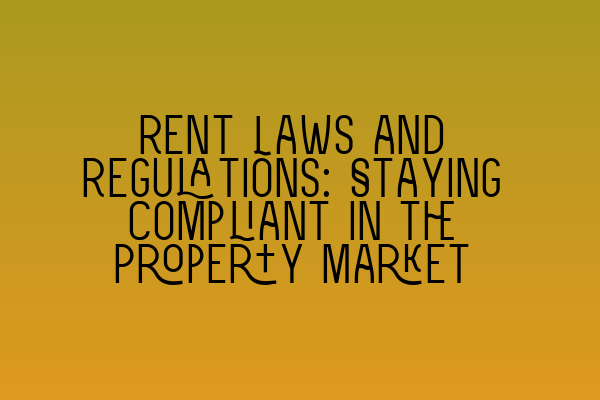Rent Laws and Regulations: Staying Compliant in the Property Market
Renting out property can be a lucrative business venture, but it comes with its fair share of responsibilities. As a property owner or landlord, it is crucial to stay compliant with rent laws and regulations to ensure a smooth and legal operation. Failure to do so can lead to severe penalties and legal complications. In this article, we will explore the key aspects of rent laws and regulations and provide helpful tips on how to stay compliant in the property market.
Understanding Rent Laws and Regulations
Rent laws and regulations vary from country to country and even from state to state. It is essential to familiarize yourself with the specific laws and regulations that apply to your location. By understanding the legal framework, you can ensure that your rental property meets the necessary requirements and avoid any potential legal issues.
Rental Agreement
A legally binding rental agreement is the foundation of a successful rental arrangement. It is a contract between the landlord and the tenant that outlines the terms and conditions of the tenancy. The rental agreement should include essential details, such as the rent amount, payment schedule, duration of the tenancy, security deposit, and maintenance responsibilities.
When drafting a rental agreement, it is important to consult with a property law solicitor who can provide expert advice and ensure that the agreement complies with all relevant laws and regulations. They can also include specific clauses to protect your interests as a landlord.
Rental Pricing
Setting the right rent price is crucial for both attracting tenants and ensuring a profitable return on your investment. However, rent increases must comply with local laws and regulations. Some jurisdictions impose rent control measures that limit the amount landlords can increase rents over a specified period. It is important to stay updated on these laws to avoid any violations and disputes with your tenants.
Additionally, it is advisable to conduct thorough market research to determine the fair market value for your rental property. Real estate agents and property management companies can provide valuable insights into current rental prices in your area. By setting a competitive yet reasonable rent price, you can attract quality tenants and minimize vacancies.
Tenant Screening
Screening potential tenants is an essential step to minimize the risk of problematic tenants and protect your property. It is crucial to carry out background checks, credit checks, and reference checks to assess a tenant’s reliability and financial stability.
However, it is important to comply with fair housing laws during the screening process. These laws prohibit discrimination on the basis of race, color, religion, national origin, sex, disability, and familial status. By following fair housing guidelines, you can ensure equal treatment for all applicants and avoid legal repercussions.
Property Maintenance
As a landlord, you have a legal obligation to provide a safe and habitable living environment for your tenants. This includes regular property maintenance and repairs. Neglecting property maintenance not only puts your tenants at risk but also exposes you to legal liabilities.
Implementing a proactive maintenance plan is essential to stay compliant with property regulations. Regular inspections can help identify and address any potential maintenance issues promptly. It is also crucial to keep accurate records of repairs and maintenance activities, as they can be crucial in case of legal disputes.
Tenant Disputes and Evictions
Unfortunately, disputes with tenants can arise, and in some cases, eviction may be necessary. It is vital to follow the proper legal procedures when dealing with tenancy disputes and evictions.
Consulting with a property law solicitor can provide you with expert guidance on handling tenant disputes and evictions in compliance with the law. They can help you navigate through the legal processes, advise you on the required notices, and ensure that your actions are within the boundaries of the law.
Staying Informed and Updated
Rent laws and regulations are subject to change, so it is crucial to stay informed and updated on any legal developments. Subscribing to reliable industry publications, attending property law seminars and workshops, and consulting with legal professionals can help you stay ahead of any legal changes that may affect your rental business.
Keeping up with changes in legislation not only ensures compliance but also demonstrates your commitment to providing a safe and fair housing environment for your tenants, enhancing your reputation as a responsible landlord.
In conclusion, staying compliant with rent laws and regulations is essential for any landlord or property owner. By understanding and adhering to the legal framework, implementing proper rental agreements, conducting thorough tenant screenings, maintaining the property, and seeking professional legal advice when needed, you can ensure a smooth and compliant operation in the property market.
Remember, compliance is not just about avoiding penalties; it is about fostering positive tenant-landlord relationships, safeguarding your investment, and maintaining a thriving rental business.
For more information on property law and preparing for your SQE exams, check out these related articles:
– SQE 1 Practice Exam Questions
– SQE 1 Practice Mocks FLK1 FLK2
– SQE 2 Preparation Courses
– SQE 1 Preparation Courses
– SRA SQE Exam Dates
Remember, expert advice is just a phone call away. Contact SQE Property Law & Land Law today to discuss your property-related legal needs.
